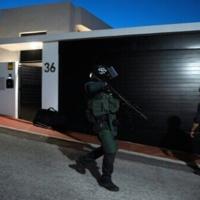Spanish police officers, heavily armed and wearing face masks, raided a luxury home in Spain’s Costa del Sol region last week at dawn to apprehend a 40-year-old suspected drug trafficker.
The suspect is believed to be associated with a major cocaine cartel operating in Europe and beyond, and his arrest followed a three-year operation involving law enforcement from 10 different countries.
This operation shed light on the fact that the sunny coastal region has become a haven for international criminal organizations whose members can easily blend in with wealthy residents from around the world.
In recent years, more dangerous gangs have moved in, causing concern in the Mediterranean region, known for its glamour since the 1970s when the Saudi royal family started spending summers in Marbella.
While the Costa del Sol is often used for money laundering, it is drug trafficking that brings about “reckless delinquency, delinquency with no scruples,” as stated by Julio Martinez Carazo, the chief prosecutor in Marbella.
In the past, crime in the region was mainly committed by Spanish nationals, and the discovery of a gun was considered rare, but now, law enforcement regularly encounters automatic weapons, according to Martinez Carazo.
Spain serves as the entry point to Europe for North African hashish and South American cocaine, making it an attractive location for international criminal groups.
Being the second-most visited country globally, Spain’s connectivity to other destinations further enhances its appeal.
– ‘Scores being settled’ –
Police in the Costa del Sol have recently apprehended suspected drug traffickers from various countries including Albania, France, Germany, Italy, Lithuania, Poland, and the Netherlands.
Locals have been particularly alarmed by five shootings this year in Marbella related to drug thefts by rival gangs, including one in March targeting a popular restaurant frequented by celebrities.
“Numerous criminal groups maintain a consistent presence in Costa del Sol, leading to occasional settling of scores,” stated Antonio Martinez Duarte, the head of the national police’s drugs and organized crime unit UDYCO.
In April, local authorities launched “Plan Marbella” to combat crime by increasing police presence in the city of approximately 141,000 people and conducting raids on several famous nightclubs.
During the first month of the plan, ten individuals were arrested, including some who were wanted in their home countries.
“It is an acknowledgment by law enforcement that a problem exists here,” commented former Marbella mayor Pepe Bernal, expressing concern over the establishment of international criminal groups in the region causing “great dismay”.
“Previously, these individuals came to Marbella to spend or enjoy their wealth,” added the local opposition councilor.
The opposition has raised questions about Marbella’s conservative mayor Angeles Munoz after her Swedish stepson, Joakim Broberg, was charged with money laundering and drug trafficking, while her husband Lars Broberg faced similar charges before his passing in May 2023.
– ‘Luxury goes unnoticed’ –
Responding to AFP, Marbella town hall briefly stated that the city remains a desirable tourist destination in all aspects, including security.
Marbella’s old town and the famous Puerto Banus port, with luxury shops and exclusive establishments, maintain a sense of safety.
Prosecutor Martinez Carazo noted that in Marbella, luxury often goes unnoticed, making it challenging to identify illicit wealth.
Following the expiration of an extradition agreement between Britain and Spain in 1978, many British criminals settled in Costa del Sol, leading to the region being dubbed the “Costa del Crime” by the British press.
Among them was Charlie Wilson, a perpetrator of the “Great Train Robbery” in 1963, who was murdered at his Marbella residence in 1990.
In the 1980s, the Costa del Sol had mafiosos but no mafia, as recalled by ex-mayor Bernal. Criminal gang members were known for their lavish lifestyles as jet-setters back then.
“Now they operate under the radar, unknown, but their organizations are present, and that’s dangerous,” he concluded.
al-jhe/ds/rlp





